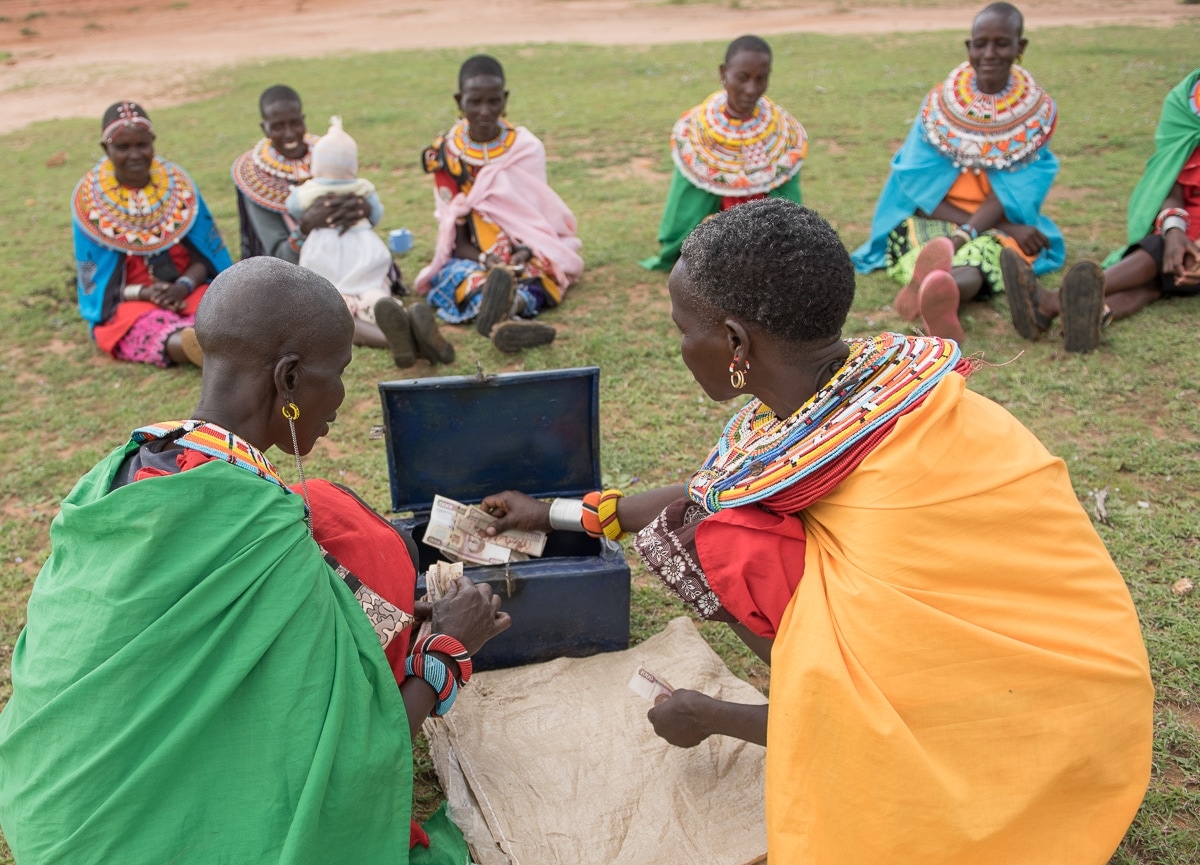Aug 14, 2018 | by Rosalie Biaba, The Panzi Foundation & Nicole Mills, The BOMA Project

Jane Klonsky © The BOMA Project
Innovations in Kenya and the DRC lower barriers to financial inclusion.
Women comprise 56% of the 1.7 billion adults globally without access to formal financial services. The gender inequality is more pronounced in Sub-Saharan Africa, where 30% of women have an account versus 39% of men. Low incomes, illiteracy and innumeracy, geographical isolation, and limited mobility all restrict women’s access to financial services.
The BOMA Project and The Panzi Foundation work with marginalized groups facing exclusion due to their geographical and/or social isolation. At SG2018: The Power of Savings Groups, hosted in Kigali this May, the two teams discussed with peers how they promote last-mile inclusion for marginalized women in Kenya and the Democratic Republic of Congo (DRC).
Financial inclusion in Kenya has expanded by leaps and bounds in recent years – in 2017, 82% of adults had bank accounts. However, the gender gap in account ownership persists and there are pockets of the country where financial inclusion has proved to be challenging. BOMA works with pastoralist women in six remote and rural counties of Marsabit, Samburu, Isolo, Garissa, Turkana, and Wajir in Northern Kenya, where financial inclusion is especially low. In addition to facing geographical isolation, the participants in BOMA’s poverty graduation program use oral accounting systems and have low numeracy and literacy levels. In a baseline study of 750 women, only 8% could read, compared to 74% nationwide. Geographic isolation and low literacy rates make it especially hard for pastoral women to benefit from modern banking services.
BOMA and My Oral Village, an organization linking innumerate and semi-numerate populations with financial services, are exploring innovative approaches to overcome the literacy and numeracy challenges, by:
In addition to facilitating numeracy training, building trust and creating incentives are crucial for making women comfortable with formal savings. To that end, BOMA also facilitates savings groups for women who are at risk of financial exclusion. Members attend monthly check-ins to record contributions, account accumulation, and targets. Accountability to and encouragement from other group members help keep participants on track and support those taking loans to start or maintain businesses. BOMA’s activities not only bolster financial literacy and numeracy but also provide access to financial services.
The Democratic Republic of Congo (DRC) has one of the lowest rates of banked populations in the world: 40% and 34% among women and men respectively. But some are more vulnerable than others, with one such group being women who turn to sex work due to lack of alternative income-generating activities. According to UNAIDS, in 2016, there were around 2.9 million sex workers in the DRC, the majority of them women and girls with high levels of poverty facing extreme social exclusion.
Sex workers face additional dimensions of financial exclusion. Service providers often don’t operate in the areas where the women and girls work, transaction costs and interest rates can be prohibitive, and they may have preconceived notions about the credibility of sex workers that keeps them from offering services. From a demand perspective, multiple factors including low financial numeracy, low trust in credit because of past experience, and limited exposure to formal financial services make sex workers wary of seeking banking services.
The Panzi Foundation and its International Center for Advanced Research and Training execute the project titled, Strengthening Livelihood Strategies of Vulnerable Women in the DR Congo in the Mpasa, Kimvula, and Yolo areas of Kinshasa. Project activities aim to identify alternative pathways to income to support women’s transition from sex work or, if they decide to remain in sex work, to help them better negotiate their working conditions. One such activity empowers sex workers and enhances their skills through savings groups. In addition to nutritional and agricultural skills training, the project incorporates savings groups to improve saving behaviors, develop links to formal banking services, and build solidarity within the groups. Savings groups meet weekly to save and exchange ideas on gender issues, income-generating options, and access to land, inputs, credit, and health services. To date, the uptake of savings accounts suggests that the project has made progress in building trust and relationships. In Mpasa, for example, analyses reveal that average monthly savings increased from USD 1.17 per woman at the start of the project in August 2017 to USD 6.43 per woman in April 2018. Collective action, awareness of savings, and skills-building have improved participants’ perceptions of savings. As beneficiaries share their positive experiences, community perceptions of financial services also improve.
Savings groups provide more than just savings and access to credit. Savings groups are useful as a platform for women and men to stimulate community and regional level changes. They offer flexibility and proximity to women and their role is holistic — savings groups introduce complementarities such as health trainings or decision-making skills that can be very helpful. For women facing some of the biggest financial barriers, savings groups that build trust, and financial service providers that innovate to meet their needs, are paving the way to economic empowerment.
Rosalie Biaba Apasa is a Research Assistant at ICART. She has worked with emergency assistance projects for internally displaced persons and survivors of sexual and gender-based violence in the eastern part of DR Congo. She currently manages a project focusing on Strengthening Livelihood Strategies of Vulnerable Women in the DRC, funded by the Bill & Melinda Gates Foundation.
Nicole Mills is the Director of Marketing and Communications for The BOMA Project, a U.S. based nonprofit implementing a poverty graduation program in the drylands of East Africa. She joined the BOMA team in January 2017, and is responsible for guiding the strategy for all communications, website, public relations, donor messaging and collateral to consistently articulate BOMA’s mission, vision, and impact.
Categories: Sub-Saharan Africa Women and Girls English Blog Womens Economic Empowerment Blog WebinarsBlogs

1621 North Kent Street, Ste 900,
Arlington, VA, 22209
P 202.534.1400
F 703.276.1433
Website Photos: © mari matsuri
